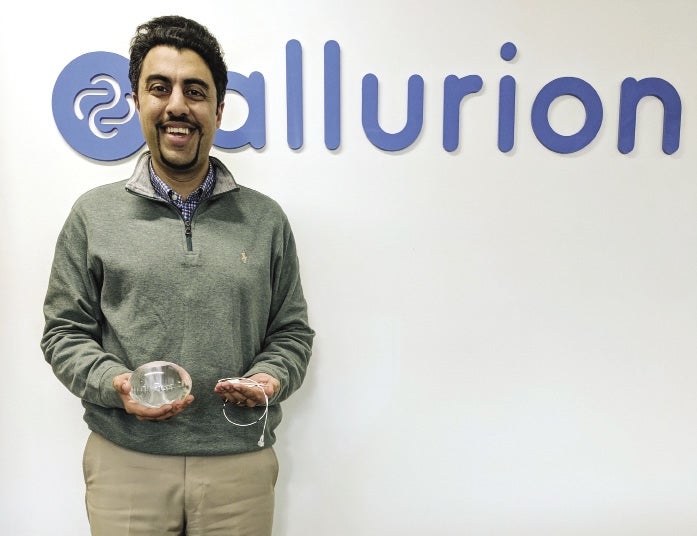When Shantanu Gaur and Samuel Levy were students at Harvard Medical School, they noticed a striking similarity among their patients. For those who struggled with weight, many weren’t satisfied with how effective dieting was, and few wanted to resort to invasive and costly surgery.
The students picked up on something else: Being overweight was common to so many health issues, from organ failure and heart disease to cancer and infertility.
“It really touches everything,” Gaur said.
Gaur and Levy weren’t the first to try making a new product to help people lose weight. But their company, Natick-based Allurion, is creating what they say would be the first gastric balloon not requiring an endoscopic procedure or anesthesia.
The Elipse Balloon, Allurion’s product under development for nearly a decade, is swallowed in a capsule during a doctor’s visit that could last only 15 or 20 minutes. A nurse or nurse practitioner then fills the balloon through a catheter with enough fluid to fill the balloon to nearly the size of an orange.
The balloon weighs about one pound and is large enough to fill about half of a stomach.
“It’s basically just like having a meal in your stomach,” Gaur said.
It makes a patient feel full much more easily and is aimed at helping patients lose 10 to 15 percent of their body weight. After four months, a polymer on one end of the balloon wears away, causing the balloon to deflate and then pass naturally through the body.
The Elipse Balloon is already used in 12 countries in Europe and the Middle East, and Allurion expects to have its 10,000th patient by the end of the year after two years on the market. The company is now enrolling 400 patients for a clinical study in the United States, with a plan to receive results next year and win U.S. Food & Drug Administration approval by 2020.
A growing market
The balloon would be the latest aim at tackling an ever-growing obesity problem in the United States. Last year, seven states had adult obesity rates over 35 percent, according to an annual report by the New Jersey-based Robert Wood Johnson Foundation.
Even Massachusetts, with one of the nation’s lowest obesity rates, has not been able to curb a sharply worsening problem in the last few decades. Just 10.1 percent of Massachusetts adults were obese in 1990, but by last year that rate hit 25.9 percent, the Robert Wood Johnson Foundation report said.
Cases of diabetes and hypertension, among other ailments, have risen accordingly.
With such high numbers, Allurion has a potentially sprawling segment of the population it could treat. Gaur, the company’s CEO, and Levy, its Paris-based president (the company also has an office in Dubai), felt given the broad scope of obesity, there weren’t nearly enough potential remedies between common dieting and more extreme measures, like gastric bypass surgery.
“There’s a clear mismatch between the scale of the problem and what’s being done in a scalable way,” said Gaur, who grew up in Pittsburgh to Indian-born parents.
From the dorm room to the clean room
While still Harvard Medical School students, Gaur and Levy began making relatively crude experiments in Gaur’s Harvard Square apartment. A Ziploc bag stood in for a stomach, and the two worked with mixtures of food passed through a blender and artificial gastric fluid to test how well their balloon stood up after months.
“We had a lot of sleepless nights and a lot of long weekends,” Gaur said.
They knew from existing products balloons would work in a stomach to make someone feel full, but they had two other aspects to figure out: how to easily get a balloon into a patient’s stomach and then to have it pass through the body naturally.
Their product would have to be relatively convenient, non-intrusive and affordable enough to be available to a meaningful segment of the population, they determined.
Gaur and Levy were so excited enough about the possibility after graduating, they skipped their residency programs that would have led to work as physicians and instead experimented.
After what Gaur said was hundreds of iterations of a product, in 2009 they had something like what would become the Elipse Balloon. In the years just after the Great Recession, fundraising was difficult, but Allurion has raised $37 million to date. Gaur credits the co-founders’ clear vision and easy-to-identify problem of obesity as reasons they were able to find funding during a time when funding was so hard to come by.
“Great companies come out of periods like that,” Gaur said.
Overseas, the Elipse Balloon is selling for around $3,500, or about half the price of other gastric balloons. The company doesn’t expect health insurers to cover the cost once it hits the market in the United States.
The balloon will come with a scale and an app to help patients track their progress, and Gaur says patients will be urged to work with a nutritionist to continue their weight loss after the balloon’s four months in the stomach are up.
Already, Allurion has reached capacity at its Natick headquarters. A 10,000 square-foot clean room just down the street is already in the works in anticipation of receiving FDA approval.

